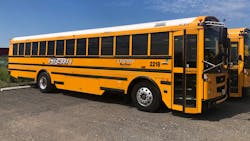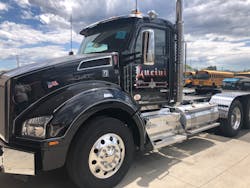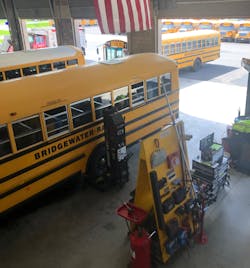Because it operates and services school buses, uptime and safety are paramount concerns for Lucini Transportation. “Our maintenance staff is a big part of ensuring we’re providing safe, reliable service,” noted Bill Lucini, president of the family business. “They make sure the buses are in top condition and that there is little downtime.”
Founded in 1959, the Bridgewater, Massachusetts-based Lucini Transportation has grown from ten school buses in 2008 to more than 200 today. The Thomas Built models on Freightliner chassis are used under municipal contracts with various school districts. Lucini also fields 11 motor coaches for charter service, 60 Ford Econoline and Transit E150 vans for special needs student transportation, and 10 tractors and dump trailers in a gravel hauling operation.
Along with Lucini’s growth came the need for a larger and more modern maintenance facility than the five-bay shop it was using at a former dealership. Three years ago the company moved into a newly built seven-bay shop located adjacent to its corporate offices. Also in operation is a two-bay facility in Falmouth, Massachusetts, where the company fields 75 school buses.
“Our new shop was designed for our operation and our technicians,” Lucini related. “It has a high roof and we lined the ceiling with a washable and reflective material that is used in dairy farms to ensure cleanliness and brightness. The liner is also an insulation and we added radiant heat beneath the floor and a waste oil fired furnace.”For Lucini, its new shop was also a means of attracting technicians and becoming more efficient. “We knew we had some issues in our maintenance operation and more importantly we realized we needed help to address them,” Lucini stated. “That’s why we reached out to DWS Fleet Management Services. We’ve known Darry Stuart for many years, and we knew his leadership capabilities and expertise were the answer.”
Since DWS began working with Lucini, the company has been able to add 80 buses to its fleet without needing more maintenance help. “We’re doing more work with less people today,” Lucini said. “Our current staff of six technicians and one parts person is four fewer than two years ago.
“When we bid for the school bus contract in Falmouth, the previous provider had three technicians at that location,” Lucini added. “We operate that location with a single technician three days a week and the other two days he works at the main shop. Having the right person is what makes that work.”
Today, Lucini’s technicians are assigned to different aspects of the operation, including roles handling buses, coaches, vans, gravel trucks and on-board cameras. They also operate four fully-equipped service trucks for quick response to unscheduled repairs, especially if a bus carrying schoolchildren breaks down.In addition to a new approach to managing technicians, Lucini credits Stuart with putting in place effective shop organization and maintenance programs, including detailed inspection checklists and standardized operating procedures. The result, he noted, has been the near-elimination of issues during state mandated school bus inspections, which take place three times a year.
In the Lucini shop as well, rolling sandwich boards with common tools are in place to ensure they are always accessible, and Rotary four-post mobile lifts are credited with boosting productivity and morale. “We always used bumper jacks,” Lucini related, “but after buying one four-post lift, we started seeing technicians come in early to have the lift that day. Now we have four lifts, which not only improve the work environment. They also save time.”
The Lucini maintenance operation is also now being managed using the Zonar electronic verified inspection reporting (EVIR) solution to receive information on school buses four times a day. “By performing inspections digitally and following a set process, it takes less time and the results are more accurate,” Lucini said. “That also makes the fleet safer and more reliable because we can respond in a timelier manner to the need for repairs.”
Lucini relies on local suppliers as well. Its parts inventory is sourced from nearby dealers, and transmission and body work, along with bulk tire mounting, are outsourced.
“We had hills to climb to have a more efficient maintenance operation,” Lucini stated, “but today our fleet management practices are well above industry standards.”
About the Author

Seth Skydel
Seth Skydel, a veteran industry editor, has more than 36 years of experience in fleet management, trucking, and transportation and logistics publications. Today, in editorial and marketing roles, he writes about fleet, service, and transportation management, vehicle and information technology, and industry trends and issues.


